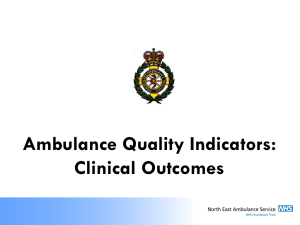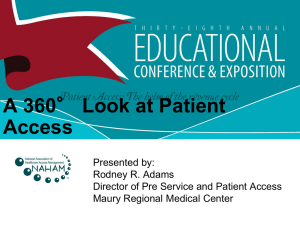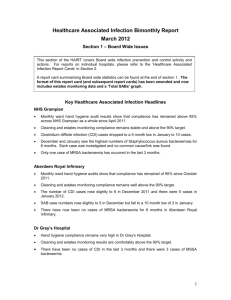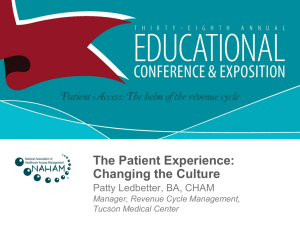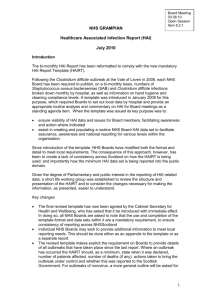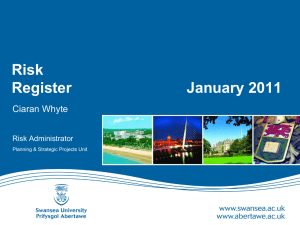Healthcare Associated Infection Report
advertisement
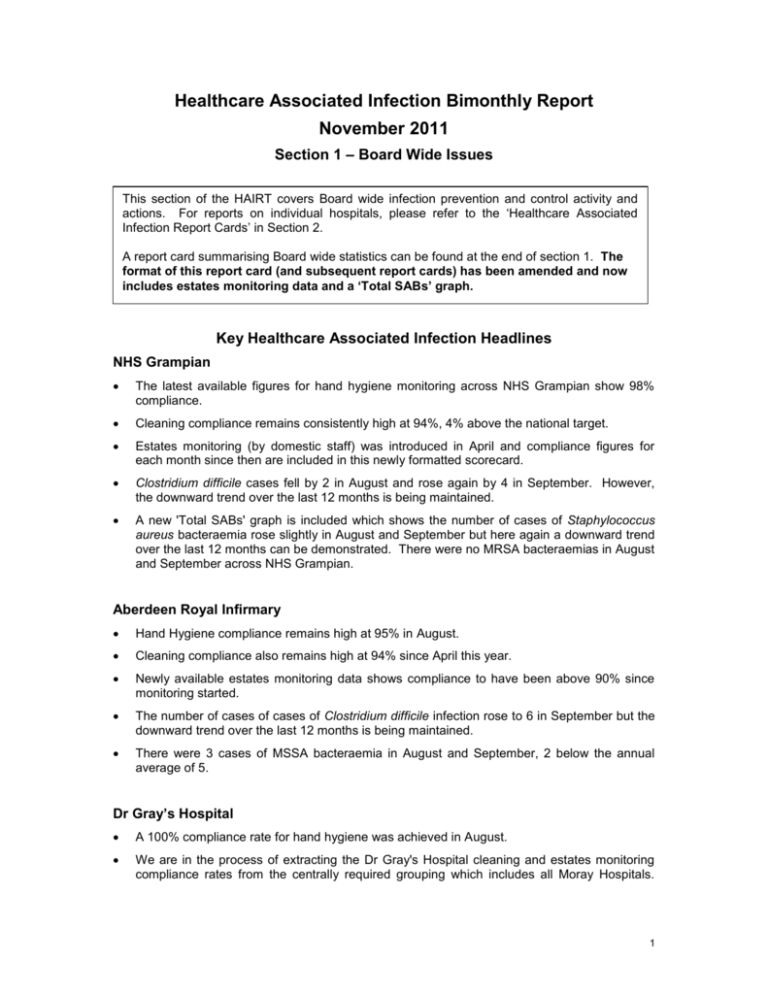
Healthcare Associated Infection Bimonthly Report November 2011 Section 1 – Board Wide Issues This section of the HAIRT covers Board wide infection prevention and control activity and actions. For reports on individual hospitals, please refer to the ‘Healthcare Associated Infection Report Cards’ in Section 2. A report card summarising Board wide statistics can be found at the end of section 1. The format of this report card (and subsequent report cards) has been amended and now includes estates monitoring data and a ‘Total SABs’ graph. Key Healthcare Associated Infection Headlines NHS Grampian The latest available figures for hand hygiene monitoring across NHS Grampian show 98% compliance. Cleaning compliance remains consistently high at 94%, 4% above the national target. Estates monitoring (by domestic staff) was introduced in April and compliance figures for each month since then are included in this newly formatted scorecard. Clostridium difficile cases fell by 2 in August and rose again by 4 in September. However, the downward trend over the last 12 months is being maintained. A new 'Total SABs' graph is included which shows the number of cases of Staphylococcus aureus bacteraemia rose slightly in August and September but here again a downward trend over the last 12 months can be demonstrated. There were no MRSA bacteraemias in August and September across NHS Grampian. Aberdeen Royal Infirmary Hand Hygiene compliance remains high at 95% in August. Cleaning compliance also remains high at 94% since April this year. Newly available estates monitoring data shows compliance to have been above 90% since monitoring started. The number of cases of cases of Clostridium difficile infection rose to 6 in September but the downward trend over the last 12 months is being maintained. There were 3 cases of MSSA bacteraemia in August and September, 2 below the annual average of 5. Dr Gray’s Hospital A 100% compliance rate for hand hygiene was achieved in August. We are in the process of extracting the Dr Gray's Hospital cleaning and estates monitoring compliance rates from the centrally required grouping which includes all Moray Hospitals. 1 This has been achieved back to July at present. Cleaning compliance remains above the national target of 90% and cleaning compliance is very high at 98%. Dr Gray's Hospital saw its first case of Clostridium difficile infection since October 2010 in August. There were 2 cases of MSSA bacteraemia in August but no MSSA or MRSA bacteraemias in September. Woodend Hospital A 100% compliance rate for hand hygiene was achieved in August. As predicted, cleaning compliance has returned to target or slightly above in Woodend Hospital since July, since the recruitment of extra domestic staff. Estates monitoring figues show that compliance is comparatively low but has been steadily increasing since May. The number of cases of Clostridium difficile infection per month remains stable at between 0 and 2 cases per month over the last year. There were 3 cases of MSSA bacteraemia in September but there has only been once case of MRSA bacteraemia in the last 12 months. Community Hospitals Due to the size of these hospitals and the number of SABs and CDIs, Aberdeen Maternity Hospital, Royal Cornhill Hospital, Royal Aberdeen Children's Hospital and Roxburgh House figures are included in this scorecard. There were 3 cases of Clostridium difficile in August occurring in Aboyne Hospital, Fraserburgh Hospital and Roxburghe House. There were single cases of MSSA bacteraemia in August and September (both occurring in Royal Aberdeen Children’s Hospital) but no MRSA bacteraemias have occurred in this group of hospitals since September 2010. Out of Hospital The number of cases of Clostridium difficile infection diagnosed outwith hospital or within 48 hours of being admitted to hospital dropped to an 8 month low in August and rose again slightly in September. A downward trend can be demonstrated over the last 12 months. MSSA bacteraemias rose slightly in August and September (increases of 1 case each month). Again, a downward trend can be demonstrated. There have been no cases of MRSA bacteraemia since April. 2 Staphylococcus aureus (including MRSA) Staphylococcus aureus is an organism which is responsible for a large number of healthcare associated infections, although it can also cause infections in people who have not had any recent contact with the healthcare system. The most common form of this is Meticillin Sensitive Staphylococcus Aureus (MSSA), but the more well known is MRSA (Meticillin Resistant Staphylococcus Aureus), which is a specific type of the organism which is resistant to certain antibiotics and is therefore more difficult to treat. More information on these organisms can be found at: Staphylococcus aureus : http://www.nhs24.com/content/default.asp?page=s5_4&articleID=346 MRSA: http://www.nhs24.com/content/default.asp?page=s5_4&articleID=252 NHS Boards carry out surveillance of Staphylococcus aureus blood stream infections, known as bacteraemias. These are a serious form of infection and there is a national target to reduce them. The number of patients with MSSA and MRSA bacteraemias for the Board can be found at the end of section 1 and for each hospital in section 2. Information on the national surveillance programme for Staphylococcus aureus bacteraemias can be found at: http://www.hps.scot.nhs.uk/haiic/sshaip/publicationsdetail.aspx?id=30248 Current HEAT Status The Health Protection Scotland quarterly report on the surveillance of Staphylococcus aureus bacteraemias which was published on 5 October 2011 showed that between 1 April and 30 June 2011 the reported SAB rate in NHS Grampian was 0.403 episodes per 1000 acute occupied bed days (AOBDs) compared with 0.309 for NHS Scotland as a whole. It should be noted that this rate is based on historical activity data and more information about this can be found at: http://www.hps.scot.nhs.uk/haiic/sshaip/publicationsdetail.aspx?id=30248 For MRSA bacteraemia the rate was 0.044 episodes per 1000 AOBDs compared with 0.040 in NHS Scotland. For MSSA bacteraemia the rate was 0.359 cases per 1000 AOBDs compared with 0.269 in NHS Scotland. NHS Grampian’s MRSA and MSSA bacteraemia rates were higher than the national average for this quarter. Clostridium difficile Clostridium difficile is an organism which is responsible for a large number of healthcare associated infections, although it can also cause infections in people who have not had any recent contact with the healthcare system. More information can be found at: http://www.nhs.uk/conditions/Clostridium-difficile/Pages/Introduction.aspx NHS Boards carry out surveillance of Clostridium difficile infections (CDI), and there is a national target to reduce these. The number of patients with CDI for the Board can be found at the end of section 1 and for each hospital in section 2. Information on the national surveillance programme for Clostridium difficile infections can be found at: http://www.hps.scot.nhs.uk/haiic/sshaip/ssdetail.aspx?id=277 Current HEAT Status The HPS quarterly report on the surveillance of CDI which was also published on 5 October 2011 showed that between 1 April and 30 June 2011 the reported CDI rate in patients over 65 years 3 old in NHS Grampian was 0.27 episodes per 1000 total occupied bed days (TOBDs) compared with 0.31 for NHS Scotland as a whole. It should be noted that this rate is based on historical activity data and more information about this can be found at: http://www.hps.scot.nhs.uk/haiic/sshaip/ssdetail.aspx?id=277 Hand Hygiene Good hand hygiene by staff, patients and visitors is a key way to prevent the spread of infections. More information on the importance of good hand hygiene can be found at: http://www.washyourhandsofthem.com/ NHS Boards monitor hand hygiene and ensure a zero tolerance approach to non compliance. The hand hygiene compliance score for the Board can be found at the end of section 1 and for each hospital in section 2. Information on national hand hygiene monitoring can be found at: http://www.hps.scot.nhs.uk/haiic/ic/nationalhandhygienecampaign.aspx The NHS Hand Hygiene Campaign 15th Bi-monthly Audit Report which was published in September 2011 confirmed that NHS Grampian achieved a compliance figure of 95%. Cleaning and the Healthcare Environment Keeping the healthcare environment clean is essential to prevent the spread of infections. NHS Boards monitor the cleanliness of hospitals and there is a national target to maintain compliance with standards above 90%. The cleaning compliance score for the Board can be found at the end of section 1 and for each hospital in section 2. Information on national cleanliness compliance monitoring can be found at: http://www.hfs.scot.nhs.uk/online-services/publications/hai/ Healthcare environment standards are also independently inspected by the Healthcare Environment Inspectorate. More details can be found at: http://www.nhshealthquality.org/nhsqis/6710.140.1366.html Cleaning and Estates Monitoring The NHSScotland National Cleaning Compliance Report Quarter 4 results (April 2011 - June 2011) was published on 15 September 2011. This report indicates that compliance with the cleaning specification monitoring in NHS Grampian is at 93%. In this report, Woodend Hospital cleaning compliance has improved slightly to 87.4% and local figures for July, August and September show compliance at 90%, 91% and 91% respectively. This report also includes estates monitoring figures. Across all participating hospitals in NHS Grampian compliance was above the 90% target with an overall compliance score of 92.5%. Healthcare Environment Inspectorate (HEI) The HEI performed an unannounced inspection of Royal Aberdeen Children’s Hospital on 26 October. Although the draft report is awaited, initial written feedback included: 4 Overall the hospital was found to be clean. A new display format for your MRSA/C. diff infection rates (lead by the Infection Prevention and Control Team) was in a child friendly format which was easy to understand and a big improvement from last time we visited. There was good provision of PPE in all areas visited and good awareness of the rationale for the isolation of patients among nursing staff. There was also good signage on isolation rooms. The approach of the Infection Control Team seemed to be heavily focussed on being reactive rather than proactive. Consistent approaches to hand hygiene and environmental audits were required. There was some non-compliance with policy around PPE and mattress disposal. A further announced inspection took place on 15 and 16 November to Aberdeen Maternity Hospital. Initial verbal feedback included: The Charge Midwives are fully aware of their responsibilities and are empowered to perform their role Staff were very complimentary about their infection prevention and control nurse (IPCN), knew who she was and how to contact her and felt she was supportive. Joanne was well informed and visible to AMH staff. There was good staff awareness of surveillance audits and evidence of changes that have been implemented due to surveillance findings. There were good links with the infection prevention and control surveillance nurse. Environmental (HEI) audits are carried our regularly and the IPCN does assist with these. There was good compliance with the dress code and sharps and waste handling protocols. Staff were aware of the new surgical prophylaxis guidelines and antimicrobial prescribing guidelines were displayed in each area. The inspection team believed that timescales should be applied to the risk assessment process for Estates issues/work. Cleaning was generally to a good standard. NHS Grampian has been working with HIS on the implementation of a standard operating procedure for cleaning patient equipment and there was positive feedback from Charge Midwives. There was good communication with the public and HAI information at ward level was well communicated and understood. Infection Prevention and Control on-line education resources and ward based training were available. 5 Standard Operating Procedure for the Decontamination of reusable, non-invasive (communal) patient care equipment The Healthcare Environment Inspectorate (HEI) have highlighted during inspections that within NHS Grampian there was inconsistent practice around the decontamination of patient care equipment. A survey monkey questionnaire was issued to all Senior Charge Nurses (SCNs) within NHS Grampian to ascertain the awareness and usage of the current ‘Decontamination of General Purpose Equipment and Reusable Medical Devices Protocols/Guidance’ April 2010 document. 90.8% of SCNs responded to the survey monkey questionnaire and the results clearly showed that there was a general awareness of the current policy and there were some areas of good practice. However, the survey also confirmed that the current policy was not reliably implemented across the whole of NHS Grampian and there was wide variation around how the record of cleaning was maintained. It was also noted that the current policy was 37 pages long and contained a lot of detailed information which was not required on a day to day basis. It was agreed that a new Standard Operating Procedure would be developed and tested to ensure that it is fit for purpose and implementable prior to it being rolled-out across the whole of NHS Grampian. Support from Healthcare Improvement Scotland, Health Protection Scotland and Health Facilities Scotland was provided during this process, but it was led by an NHS Grampian quality improvement team comprising members of the Infection Prevention and Control Team, the Continuous Service Improvement Team, General Management and Senior Nurses. A spread plan has been developed for each acute hospital site and community hospitals which will be implemented during November and December. Incidents and Outbreaks Norovirus Prevalence Monday Point Prevalence Surveillance figures are reported to Health Protection Scotland. These capture the significant outbreaks of Norovirus in NHS Grampian and the prevalence of Norovirus activity in close to real time. They are not, and should not be interpreted as data for benchmarking or judgement. The data can be used for the assessment of risk and Norovirus outbreak preparedness only. During August and September there were no significant outbreaks of norovirus in NHS Grampian. 6 NHS Grampian Total Staphylococcus aureus Bacteraemia Cases (all ages) The latest available figures for hand hygiene monitoring across NHS Grampian show 98% compliance. Cleaning compliance remains consistently high at 94%, 4% above the national target. Estates monitoring (by domestic staff) was introduced in April and compliance figures for each month since then are included in this newly formatted scorecard. Clostridium difficile cases fell by 2 in August and rose again by 4 in September. However, the downward trend over the last 12 months is being maintained. A new 'Total SABs' graph is included which shows the number of cases of Staphylococcus aureus bacteraemia rose slightly in August and September but here again a downward trend over the last 12 months can be demonstrated. There were no MRSA bacteraemias in August and September across NHS Grampian. 30 25 20 15 10 5 0 Oct-10 Oct-10 18 Hand Hygiene Monitoring Compliance (%) Oct-10 99 Nov-10 94 Dec-10 96 Jan-11 91 Feb-11 94 Mar-11 97 Apr-11 94 May-11 96 Jun-11 95 Jul-11 95 Aug-11 98 Nov-10 Nov-10 22 Dec-10 Dec-10 8 Jan-11 Jan-11 17 Feb-11 Feb-11 5 Mar-11 Mar-11 15 Apr-11 Apr-11 15 May-11 May-11 14 Jun-11 Jul-11 Jun-11 21 Aug-11 Jul-11 10 Sep-11 Aug-11 12 Sep-11 13 Sep-11 MRSA Bacteraemia Cases (all ages) 30 25 Cleaning Compliance (%) Oct-10 94 Nov-10 94 Dec-10 93 Jan-11 93 Feb-11 93 Mar-11 93 Apr-11 93 May-11 92 Jun-11 94 Jul-11 94 Aug-11 94 Sep-11 94 20 15 10 5 Estates Monitoring Compliance (%) Oct-10 Nov-10 Dec-10 Jan-11 Feb-11 Mar-11 Apr-11 93 May-11 93 Jun-11 92 Jul-11 92 Aug-11 92 Sep-11 92 0 Oct-10 Oct-10 3 Nov-10 Nov-10 0 Dec-10 Dec-10 1 Clostridium difficile Cases (all ages) Jan-11 1 Feb-11 Feb-11 1 Mar-11 Mar-11 1 Apr-11 Apr-11 3 May-11 May-11 1 Jun-11 Jul-11 Jun-11 1 Aug-11 Jul-11 1 Sep-11 Aug-11 0 Sep-11 0 MSSA Bacteraemia Cases (all ages) 30 100 30 25 25 80 20 20 60 15 15 10 40 10 5 20 5 00 0 Oct-10 Oct-10 28 Jan-11 Nov-10 Nov-10 15 Dec-10 Dec-10 8 Jan-11 Jan-11 17 Feb-11 Feb-11 13 Mar-11 Mar-11 11 Apr-11 Apr-11 14 May-11 May-11 14 Jun-11 Jun-11 18 Jul-11 Aug-11 Jul-11 11 Sep-11 Aug-11 9 Oct-10 Oct-10 Nov-10 Nov-10 Dec-10 Dec-10 Sep-11 15 Oct-10 15 Nov-10 22 Dec-10 7 Jan-11 Jan-11 Jan-11 16 Feb-11 Feb-11 Feb-11 4 Mar-11 Mar-11 Mar-11 14 Apr-11 Apr-11 Apr-11 12 May-11 May-11 May-11 13 Jun-11 Jun-11 Jul-11 Jul-11 Jun-11 20 Aug-11 Aug-11 Jul-11 9 Sep-11 Sep-11 Aug-11 12 Sep-11 13 7 Quarterly rolling year Clostridium difficile Infection Cases (aged 65 and over) per 1000 total occupied bed days for HEAT Target Measurement 1 0.9 0.8 0.7 0.6 0.5 0.4 0.3 0.2 0.1 0 Apr 10 Mar 11 Jul 10 Jun 11 Oct 10 Sept 11 Jan 11 Dec 11 Apr 11 Mar 12 Jul 11 Jun 12 Actual Performance Actual Performance Target Oct 11 Sept 12 Jan 12 Dec 12 Apr 12 Mar 13 Target Apr 10 Mar 11 Jul 10 Jun 11 Oct 10 Sept 11 Jan 11 Dec 11 Apr 11 Mar 12 Jul 11 Jun 12 Oct 11 Sept 12 Jan 12 Dec 12 Apr 12 Mar 13 0.41 0.89 0.36 0.52 0.50 0.49 0.47 0.45 0.43 0.41 0.39 Quarterly rolling year Staphylococcus aureus Bacteraemia Rates per 1000 Acute Occupied Bed Days for HEAT Target Measurement 0.4 0.35 0.3 0.25 0.2 0.15 0.1 0.05 0 Apr 10 Mar 11 Jul 10 Jun 11 Oct 10 Sept 11 Actual Performance Target Jan 11 Apr 11 Dec 11 Mar 12 Actual Performance Jul 11 Jun 12 Oct 11 Sept 12 Jan 12 Dec 12 Apr 12 Mar 13 Target Apr 10 Mar 11 Jul 10 Jun 11 Oct 10 Sept 11 Jan 11 Dec 11 Apr 11 Mar 12 Jul 11 Jun 12 Oct 11 Sept 12 Jan 12 Dec 12 Apr 12 Mar 13 0.36 0.36 0.32 0.31 0.30 0.29 0.28 0.28 0.27 0.26 8 Healthcare Associated Infection Reporting Template (HAIRT) Section 2 – Healthcare Associated Infection Report Cards The following section is a series of ‘Report Cards’ that provide information, for each acute hospital [and key community hospitals] in the Board, on the number of cases of Staphylococcus aureus blood stream infections (also broken down into MSSA and MRSA) and Clostridium difficile infections, as well as hand hygiene, cleaning and estates monitoring compliance. In addition, there is a single report card which covers all community hospitals [which do not have individual cards], and a report which covers infections identified as having been contracted from outwith hospital. The information in the report cards is provisional local data, and may differ from the national surveillance reports carried out by Health Protection Scotland and Health Facilities Scotland. The national reports are official statistics which undergo rigorous validation, which means final national figures may differ from those reported here. However, these reports aim to provide more detailed and up to date information on HAI activities at local level than is possible to provide through the national statistics. Understanding the Report Cards – Infection Case Numbers Clostridium difficile infections (CDI) and Staphylococcus aureus bacteraemia (SAB) cases are presented for each hospital, broken down by month. Staphylococcus aureus bacteraemia (SAB) cases are further broken down into Meticillin Sensitive Staphylococcus aureus (MSSA) and Meticillin Resistant Staphylococcus aureus (MRSA). Data are presented as both a graph and a table giving case numbers. More information on these organisms can be found on the NHS24 website: Clostridium difficile : http://www.nhs24.com/content/default.asp?page=s5_4&articleID=2139&sectionID=1 Staphylococcus aureus : http://www.nhs24.com/content/default.asp?page=s5_4&articleID=346 MRSA: http://www.nhs24.com/content/default.asp?page=s5_4&articleID=252&sectionID=1 For each hospital the total number of cases for each month are those which have been reported as positive from a laboratory report on samples taken more than 48 hours after admission. For the purposes of these reports, positive samples taken from patients within 48 hours of admission will be considered to be confirmation that the infection was contracted prior to hospital admission and will be shown in the “out of hospital” report card. Understanding the Report Cards – Hand Hygiene Compliance Good hand hygiene is crucial for infection prevention and control. More information can be found from the Health Protection Scotland’s national hand hygiene campaign website: http://www.washyourhandsofthem.com/ Hospitals carry out regular audits of how well their staff are complying with hand hygiene. The first page of each hospital report card presents the percentage of hand hygiene compliance for all staff in both graph and table form. Understanding the Report Cards – Cleaning Compliance Hospitals strive to keep the care environment as clean as possible. This is monitored through cleaning compliance audits. More information on how hospitals carry out these audits can be found on the Health Facilities Scotland website: http://www.hfs.scot.nhs.uk/online-services/publications/hai/ The first page of each hospital Report Card gives the hospitals cleaning compliance percentage in both graph and table form. Understanding the Report Cards – ‘Out of Hospital Infections’ Clostridium difficile infections and Staphylococcus aureus (including MRSA) bacteraemia cases are all associated with being treated in hospitals. However, this is not the only place a patient may contract an infection. This total will also include infection from community sources such as GP surgeries and care homes and. The final Report Card report in this section covers ‘Out of Hospital Infections’ and reports on SAB and CDI cases reported to a Health Board which are not attributable to a hospital. Given the complex variety of sources for these infections it is not possible to break this data down in any more detail. 9 Aberdeen Royal Infirmary Total Staphylococcus aureus Bacteraemia Cases (all ages) Hand Hygiene compliance remains high at 95% in August. Cleaning compliance also remains high at 94% since April this year. Newly available estates monitoring data shows compliance to have been above 90% since monitoring started. The number of cases of cases of Clostridium difficile infection returned to 5 in September but the downward trend over the last 12 months is being maintained. There were 3 cases of MSSA bacteraemia in August and September, 2 below the annual average of 5. 10 9 8 7 6 5 4 3 2 1 0 Oct-10 Oct-10 7 Hand Hygiene Monitoring Compliance (%) Oct-10 100 Nov-10 90 Dec-10 90 Jan-11 93 Feb-11 96 Mar-11 95 Apr-11 75 May-11 95 Jun-11 97 Jul-11 96 Aug-11 95 Nov-10 94 Dec-10 94 Jan-11 94 Oct-10 Nov-10 Dec-10 Jan-11 Feb-11 94 Mar-11 93 Apr-11 94 May-11 94 Jun-11 94 Mar-11 Apr-11 95 May-11 94 Jun-11 93 Dec-10 5 Jan-11 7 Feb-11 Feb-11 2 Mar-11 Mar-11 3 Apr-11 Apr-11 2 May-11 May-11 5 Jun-11 Jul-11 Jun-11 8 Aug-11 Jul-11 5 Sep-11 Aug-11 3 Sep-11 3 Jul-11 94 Aug-11 94 Sep-11 94 Jul-11 96 Aug-11 93 Sep-11 92 10 9 8 7 6 5 4 3 2 1 0 Oct-10 Oct-10 1 Nov-10 Nov-10 0 Dec-10 Dec-10 0 Clostridium difficile Cases (all ages) Jan-11 Jan-11 0 Feb-11 Feb-11 1 Mar-11 Mar-11 0 Apr-11 Apr-11 0 May-11 May-11 0 Jun-11 Jul-11 Jun-11 1 Aug-11 Jul-11 1 Sep-11 Aug-11 0 Sep-11 0 MSSA Bacteraemia Cases (all ages) 10 10 100 9 9 8 8 80 7 7 6 6 60 5 5 4 4 40 3 3 2 2 20 1 1 00 0 Oct-10 Oct-10 8 Jan-11 MRSA Bacteraemia Cases (all ages) Estates Monitoring Compliance (%) Feb-11 Nov-10 9 Dec-10 Sep-11 Cleaning Compliance (%) Oct-10 95 Nov-10 Nov-10 Nov-10 5 Dec-10 Dec-10 4 Jan-11 Jan-11 2 Feb-11 Feb-11 4 Mar-11 Mar-11 3 Apr-11 Apr-11 3 May-11 May-11 4 Jun-11 Jun-11 4 Jul-11 Aug-11 Jul-11 2 Sep-11 Aug-11 2 Oct-10 Oct-10 Nov-10 Nov-10 Dec-10 Dec-10 Sep-11 5 Oct-10 6 Nov-10 9 Dec-10 5 Jan-11 Jan-11 Jan-11 7 Feb-11 Feb-11 Feb-11 1 Mar-11 Mar-11 Mar-11 3 Apr-11 Apr-11 Apr-11 2 May-11 May-11 May-11 5 Jun-11 Jun-11 Jul-11 Jul-11 Jun-11 7 Aug-11 Aug-11 Jul-11 4 Sep-11 Sep-11 Aug-11 3 Sep-11 3 10 11 Dr Gray's Hospital Total Staphylococcus aureus Bacteraemia Cases (all ages) A 100% compliance rate for hand hygiene was achieved in August. We are in the process of extracting the Dr Gray's Hospital cleaning and estates monitoring compliance rates from the centrally required grouping which includes all Moray Hospitals. This has been achieved back to July at present. Cleaning compliance remains above the national target of 90% and cleaning compliance is very high at 98%. Dr Gray's Hospital saw its first case of Clostridium difficile infection since October 2010 in August. There were 2 cases of MSSA bacteraemia in August but no MSSA or MRSA bacteraemias in September Nov-10 100 Dec-10 98 Jan-11 100 Feb-11 96 Mar-11 98 Apr-11 99 May-11 99 Jun-11 94 2 1 0 Oct-10 Oct-10 1 Hand Hygiene Monitoring Compliance (%) Oct-10 99 3 Jul-11 92 Aug-11 100 Nov-10 Nov-10 0 Dec-10 Dec-10 0 Jan-11 Jan-11 0 Feb-11 Feb-11 0 Mar-11 Mar-11 1 Apr-11 Apr-11 1 May-11 May-11 1 Jun-11 Jul-11 Jun-11 1 Aug-11 Jul-11 1 Sep-11 Aug-11 2 Sep-11 0 Sep-11 MRSA Bacteraemia Cases (all ages) 3 Cleaning Compliance (%) Oct-10 Nov-10 Dec-10 Jan-11 Feb-11 Mar-11 Apr-11 May-11 Jun-11 Jul-11 94 Aug-11 93 Sep-11 92 2 1 Estates Monitoring Compliance (%) Oct-10 Nov-10 Dec-10 Jan-11 Feb-11 Mar-11 Apr-11 May-11 Jun-11 Jul-11 99 Aug-11 93 Sep-11 98 0 Oct-10 Oct-10 0 Nov-10 Nov-10 0 Dec-10 Dec-10 0 Clostridium difficile Cases (all ages) Jan-11 Jan-11 0 Feb-11 Feb-11 0 Mar-11 Mar-11 0 Apr-11 Apr-11 0 May-11 May-11 1 Jun-11 Jul-11 Jun-11 0 Aug-11 Jul-11 0 Sep-11 Aug-11 0 Sep-11 0 MSSA Bacteraemia Cases (all ages) 3 3 100 2 2 60 80 40 1 1 20 00 0 Oct-10 Oct-10 2 Nov-10 Nov-10 0 Dec-10 Dec-10 0 Jan-11 Jan-11 0 Feb-11 Feb-11 0 Mar-11 Mar-11 0 Apr-11 Apr-11 0 May-11 May-11 0 Jun-11 Jun-11 0 Jul-11 Aug-11 Jul-11 0 Sep-11 Aug-11 1 Oct-10 Oct-10 Nov-10 Nov-10 Dec-10 Dec-10 Jan-11 Jan-11 Feb-11 Feb-11 Sep-11 0 Oct-10 1 Nov-10 0 Dec-10 0 Jan-11 0 Feb-11 0 Mar-11 Mar-11 Mar-11 1 Apr-11 Apr-11 Apr-11 1 May-11 May-11 May-11 0 Jun-11 Jul-11 Jul-11 Jun-11 1 Aug-11 Aug-11 Jul-11 1 Sep-11 Sep-11 Aug-11 2 Sep-11 0 12 Woodend Hospital Total Staphylococcus aureus Bacteraemia Cases (all ages) A 100% compliance rate for hand hygiene was achieved in August. As predicted, cleaning compliance has returned to target or slightly above in Woodend Hospital since July, since the recruitment of extra domestic staff. Estates monitoring figues show that compliance is comparatively low but has been steadily increasing since May. The number of cases of Clostridium difficile infection per month remains stable at between 0 and 2 cases per month over the last year. There were 3 cases of MSSA bacteraemia in September but there has only been once case of MRSA bacteraemia in the last 12 months. 3 2 1 0 Oct-10 Oct-10 1 Hand Hygiene Monitoring Compliance (%) Oct-10 Nov-10 90 Dec-10 92 Jan-11 91 Feb-11 95 Mar-11 Apr-11 91 May-11 91 Jun-11 90 Jul-11 92 Aug-11 100 Nov-10 Nov-10 1 Dec-10 Dec-10 0 Jan-11 Jan-11 0 Feb-11 Feb-11 0 Mar-11 Mar-11 0 Apr-11 Apr-11 2 May-11 May-11 1 Jun-11 Jul-11 Jun-11 0 Aug-11 Jul-11 0 Sep-11 Aug-11 1 Sep-11 3 Sep-11 MRSA Bacteraemia Cases (all ages) 3 Cleaning Compliance (%) Oct-10 86 Nov-10 87 Dec-10 89 Jan-11 87 Feb-11 88 Mar-11 87 Apr-11 87 May-11 87 Jun-11 88 Jul-11 90 Aug-11 91 Sep-11 91 2 1 Estates Monitoring Compliance (%) Oct-10 Nov-10 Dec-10 Jan-11 Feb-11 Mar-11 Apr-11 80 May-11 78 Jun-11 77 Jul-11 80 Aug-11 82 Sep-11 87 0 Oct-10 Oct-10 0 Nov-10 Nov-10 0 Dec-10 Dec-10 0 Clostridium difficile Cases (all ages) Jan-11 Jan-11 0 Feb-11 Feb-11 0 Mar-11 Mar-11 0 Apr-11 Apr-11 1 May-11 May-11 0 Jun-11 Jul-11 Jun-11 0 Aug-11 Jul-11 0 Sep-11 Aug-11 0 Sep-11 0 MSSA Bacteraemia Cases (all ages) 3 3 100 2 2 60 80 40 1 1 20 00 0 Oct-10 Oct-10 1 Nov-10 Nov-10 2 Dec-10 Dec-10 1 Jan-11 Jan-11 1 Feb-11 Feb-11 0 Mar-11 Mar-11 2 Apr-11 Apr-11 0 May-11 May-11 0 Jun-11 Jun-11 1 Jul-11 Aug-11 Jul-11 0 Sep-11 Aug-11 0 Oct-10 Oct-10 Nov-10 Nov-10 Dec-10 Dec-10 Jan-11 Jan-11 Feb-11 Feb-11 Sep-11 1 Oct-10 1 Nov-10 1 Dec-10 0 Jan-11 0 Feb-11 0 Mar-11 Mar-11 Mar-11 0 Apr-11 Apr-11 Apr-11 1 May-11 May-11 May-11 1 Jun-11 Jul-11 Jul-11 Jun-11 0 Aug-11 Aug-11 Jul-11 0 Sep-11 Sep-11 Aug-11 1 Sep-11 3 13 Community Hospital Infections Clostridium difficile Infection Cases 3 Due to the size of these hospitals and the number of SABs and CDIs, Aberdeen Maternity Hospital, Royal Cornhill Hospital, Royal Aberdeen Children's Hospital and Roxburgh House figures are included in this scorecard, as well as all Community Hospitals in NHS Grampian. There were 3 cases of Clostridium difficile in August occurring in Aboyne Hospital, Fraserburgh Hospital and Roxburghe House. There were single cases of MSSA bacteraemia in August and September but no MRSA bacteraemias have occurred in this group of hospitals since September 2010. 2 1 0 Oct-10 Oct-10 1 Nov-10 Nov-10 1 Dec-10 Dec-10 0 Jan-11 Jan-11 0 MSSA Bacteraemia Cases Feb-11 1 Mar-11 Mar-11 0 Apr-11 Apr-11 1 May-11 Jun-11 May-11 2 Jul-11 Jun-11 1 Aug-11 Jul-11 1 Sep-11 Aug-11 3 Sep-11 2 MRSA Bacteraemia Cases 3 3 2 2 1 1 0 0 Oct-10 Oct-10 0 Feb-11 Nov-10 1 Nov-10 Dec-10 Dec-10 0 Jan-11 Jan-11 0 Feb-11 Feb-11 0 Mar-11 Mar-11 0 Apr-11 Apr-11 0 May-11 May-11 0 Jun-11 Jun-11 0 Jul-11 Aug-11 Jul-11 0 Sep-11 Aug-11 1 Sep-11 1 Oct-10 Oct-10 0 Nov-10 Nov-10 0 Dec-10 Dec-10 0 Jan-11 Jan-11 0 Feb-11 Feb-11 0 Mar-11 Mar-11 0 Apr-11 Apr-11 0 May-11 May-11 0 Jun-11 Jul-11 Jun-11 0 Aug-11 Jul-11 0 Sep-11 Aug-11 0 Sep-11 0 14 Out of Hospital Infections Clostridium difficile Infection Cases 16 14 12 The number of cases of CDI diagnosed outwith hospital or within 48 hours of being admitted to hospital dropped to an 8 month low in August and rose again slightly in September. A downward trend can be demonstrated over the last 12 months. MSSA bacteraemias rose slightly in August and September (increases of 1 case each month). Again, a downward trend can be demonstrated. There have been no cases of MRSA bacteraemia since April. 10 8 6 4 2 0 Oct-10 Oct-10 16 Nov-10 Nov-10 7 Dec-10 Dec-10 3 Jan-11 Jan-11 14 MSSA Bacteraemia Cases Feb-11 8 Mar-11 Mar-11 4 Apr-11 Apr-11 10 May-11 Jun-11 May-11 8 Jul-11 Jun-11 12 Aug-11 Jul-11 8 Sep-11 Aug-11 3 Sep-11 7 MRSA Bacteraemia Cases 16 16 14 14 12 12 10 10 8 8 6 6 4 4 2 2 0 0 Oct-10 Oct-10 7 Feb-11 Nov-10 11 Nov-10 Dec-10 Dec-10 2 Jan-11 Jan-11 9 Feb-11 Feb-11 3 Mar-11 Mar-11 10 Apr-11 Apr-11 8 May-11 May-11 7 Jun-11 Jun-11 12 Jul-11 Aug-11 Jul-11 4 Sep-11 Aug-11 5 Sep-11 6 Oct-10 Oct-10 1 Nov-10 Nov-10 0 Dec-10 Dec-10 1 Jan-11 Jan-11 1 Feb-11 Feb-11 0 Mar-11 Mar-11 1 Apr-11 Apr-11 2 May-11 May-11 0 Jun-11 Jul-11 Jun-11 0 Aug-11 Jul-11 0 Sep-11 Aug-11 0 Sep-11 0 15


